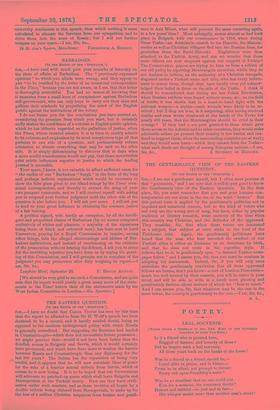THE EASTERN QUESTION.
[TO THE ED/TOR OF THII SPROTATOR.1
have no doubt that Canon Trevor has seen by this time that the report he alluded to from Sir H. Wolff's speech has been declared to be a canard, and it hardly needed denial, being so opposed to the cautious underground policy with which Russia is generally accredited. But supposing the Russians had landed in Constantinople—which does not necessitate future possession ; we might prevent that—would it not have been better than the fiendish scenes in Bulgaria and Servia, which it would certainly have prevented, and which have done more to weaken the barrier between Russia and Constantinople than any diplomacy for the last 200 years ? The Sultan has the reputation of being very sordid, and it appears that he will now entertain ideas of peace for the sake of a heavier annual tribute from Servia, which of course he is now losing. It is to be hoped that our Government will advocate no patched-up peace which shall leave Bulgaria and Herzegovinia at the Turkish mercy. How can they learn civili- sation under such masters, and as these troubles all began by a double tribute being claimed from Ileriegovinia, to make up for the loss of a million Christian taxpayers from famine and pestil- ence in Asia Minor, what will prevent the same occurring again, in a few years' time? Most unhappily, scenes almost as bad took place in Bulgaria with our countenance in 1854, when during Omar Pasha—an Austrian's—march to the Danube, the Mahom- medan as well as Christian villagers fled into the Russian lines, for protection from the Bashi-Bazouks. Englishmen were then attached to the Turkish Army, and can we wonder that these same officers are now eloquent against our support of Turkey? The Conservative papers are trying to turn us from a reform of our old policy by reporting Montenegrin atrocities, which they do not hesitate to believe, on the authority of a Christian renegade, disguised under a Turkish name and title, who has every induce- ment to invent them, though they have hardly even yet acknow- ledged their belief in those on the aide of the Turks. I think it should be remembered that during the last Polish Revolution, when Russian soldiers were found without noses, &c., on the field of battle, it was shown that in a hand-to-hand fight with the national weapon—a scythe—such wounds were likely to be re- ceived; but if they are true, is it surprising, after having received similar and even worse treatment at the hands of the Turks for nearly 400 years, that the Montenegrins should be cruel in their revenge ? If they had a sea-port granted to them which gave them access to the Adriatic and to other countries, they would make admirable sailors (at present their country is too barren and con- fined to support them, when the surrounding countries are at war) ; and they would soon learn—which they cannot from the Turks— what such deeds are thought of among European nations.—I am,


































 Previous page
Previous page